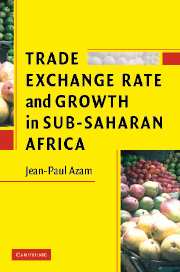Book contents
- Frontmatter
- Contents
- List of figures and tables
- Preface
- List of acronyms and abbreviations
- 1 Introduction and overview
- Part I Unrecorded trade in goods and currencies
- Part II Foreign exchange constraints
- 4 Dollars for sale: inflation and the black market premium
- 5 The public debt constraint in the CFA Zone
- 6 Currency crises, food, and the “Cola nut” effect
- Part III Longer-term growth in African countries
- General conclusion
- References
- Index
6 - Currency crises, food, and the “Cola nut” effect
Published online by Cambridge University Press: 26 May 2010
- Frontmatter
- Contents
- List of figures and tables
- Preface
- List of acronyms and abbreviations
- 1 Introduction and overview
- Part I Unrecorded trade in goods and currencies
- Part II Foreign exchange constraints
- 4 Dollars for sale: inflation and the black market premium
- 5 The public debt constraint in the CFA Zone
- 6 Currency crises, food, and the “Cola nut” effect
- Part III Longer-term growth in African countries
- General conclusion
- References
- Index
Summary
Introduction
After the Mexican crisis of December 1994, the Asian crisis of 1997 attracted a lot of attention related to the fragility of the international financial system, as did the Russian and Brazilian ones that followed. Stiglitz has used these events as the basis from which to launch a stinging attack against the IMF (Stiglitz, 2002). Although his argument has more nuance, many readers have understood his book as either an outright criticism of globalization, or as a case against capital account liberalization. I had the privilege of being the discussant of his presentation at a plenary session of the AERC in Nairobi in December 1998, where he discussed many of the ideas developed in his later book. He presented a very detailed discussion for analyzing the relatively rare and spectacular events that are currency crises, taking the case of the Asian crisis as his main source of examples. The most important message of his presentation was no doubt that financial markets are in fact dealing in information, so that financial and currency crises can provide a lot of information on the underlying trends in the economy. He blamed the occurrence of the Asian crisis, at least to a large extent, on the real estate speculation that was going on, with too much production of empty office space. A lot of non-performing loans were thus piling up on the banks' accounts. However, other researchers tend to conclude that currency crises are to a large extent self-fulfilling, and thus provide very little information on the fundamentals of the affected economy.
- Type
- Chapter
- Information
- Trade, Exchange Rate, and Growth in Sub-Saharan Africa , pp. 134 - 170Publisher: Cambridge University PressPrint publication year: 2006



